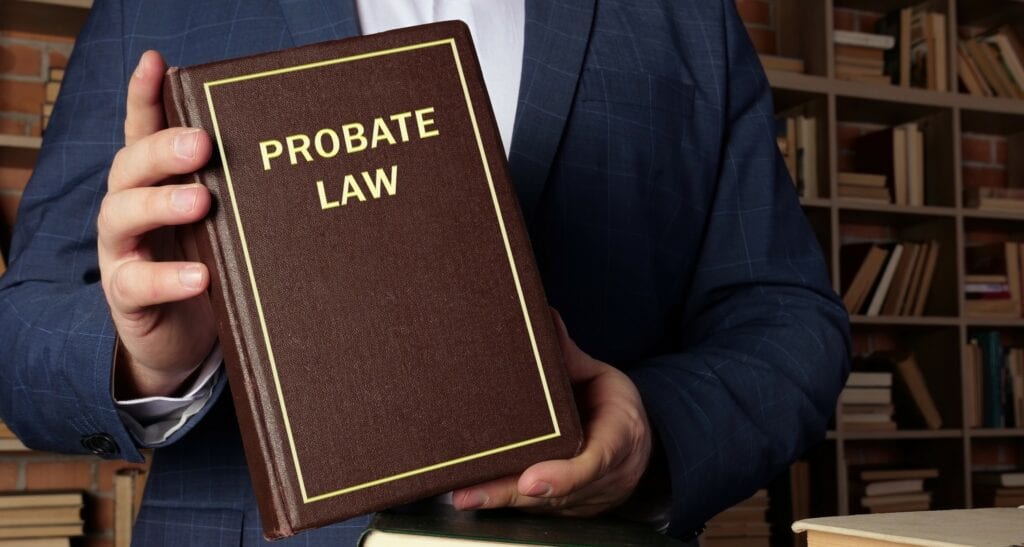Many people put off designating beneficiaries, writing a will or living trust, and ultimately creating an estate plan. However, preparation is key to making the probate process simple for your heirs after the event of your death. At CJB Law, we understand that probate law can be confusing and sometimes overwhelming.
Ultimately, the more you prepare, the more straightforward probate is after your death. So let’s simplify the complexities of probate law and explore everything you need to know.
What Is Probate Law?
Probate is the legal process in which a will is accepted as valid in a court of law. A probate court determines the validity of the will and grants approval, or probate, to the executor. The executor of the will then has the legal power to distribute the assets as described by the will.
A court supervises the entire process, including authenticating the last will and testament, filing tax returns, and distributing the estate. Not everything needs to go through probate, so it is essential to understand which assets need to go through the process.
Which Assets Go Through Probate?
Before the probate process officially begins, the deceased person’s attorney must list all probate assets and their values. This step is smoother when a final will and testament is created ahead of time. Some assets need to go through probate, and others do not. Probate assets typically include:
- Real estate
- Vehicles
- Household items
- Clothing
- Jewelry
- Collections
- Shared property known as “tenants in common”
- Other titled assets owned solely by the deceased person
Probate court is often unnecessary if the deceased person was married and spouses owned assets jointly. In addition to property with joint ownership, some states allow you to avoid probate by filing a “transfer on death” designation. The transfer on death designation allows the estate holder to select beneficiaries who will receive assets at the time of death.
With this designation established, the following assets are not subject to probate:
- Life insurance policies, IRAs, and 401(k)s with a named beneficiary
- Bank accounts with beneficiaries
- Property held in a living trust
- Property with a transfer on death designation
- Co-owned savings bonds
- Up to a certain amount of wages and salary due to the deceased person
- Household goods designated to family members under state law
How Does the Probate Process Work?
Now you know which assets go through probate, but how does the probate process work? There are many steps of the probate process that ultimately allow your assets to be distributed to their rightful new owners.
Authenticating the Will
Whoever holds the will of the deceased person needs to file it with a probate court as soon as possible with the help of a knowledgeable probate attorney. Additionally, a death certificate is often required. A judge will confirm the will’s validity, but sometimes this process involves a court hearing. If a hearing is necessary, all beneficiaries and heirs will be notified.
Appointing the Executor
During the court hearing, the judge will designate an executor. The executor is tasked with overseeing the probate process and settling the estate. Commonly, this person is already assigned in the will. The executor will receive official documentation that will allow them to perform transactions on behalf of the estate.
Posting Bond
In the case of a financial error by the executor, bonds act as an insurance policy that will reimburse any monetary damages to the affected beneficiaries. However, each state has varying rules about posting bonds, and some wills may deem that this step isn’t necessary.
Locating the Assets
The executor must take possession of all the deceased person’s assets to protect them during the probate process. They must ensure the physical assets are in a safe location. Non-physical assets such as bank accounts must be taken control of by the executor.
Determining Date of Death Values
An appraiser must determine the value of the assets upon the date of the owner’s death. In some states, the court will appoint an appraiser; otherwise, the executor can select one. In addition, account statements can determine the date of death values for certain assets.
Identifying and Notifying Creditors
Creditors are people or companies to whom money is owed. Creditors have one year from the date of death to file a claim on an estate. A notice to creditors is required, and it is usually posted as a public notice in the local newspaper. If the executor has reason to believe a creditor’s claim is invalid, it can be rejected.
Paying Debts
If creditor claims are proven valid, remaining debts must be paid. Debts after death are paid with remaining estate funds. There are standard protocols regarding debt after death, such as:
- If accounts are in the deceased person’s name only, debts are not inherited by the beneficiaries.
- If debts are co-signed with a spouse or family member, that person will inherit the debt.
- Federal student loans are forgiven upon death, but not all private loans.
- Relatives of the deceased person are not responsible for paying creditors. Instead, credit is paid out of the remaining trust funds.
- Accounts solely in the deceased person’s name must be closed, and the executor must transfer funds to designated beneficiaries.
Filing Tax Returns
Income and estate taxes still need to be filed for the year the deceased person died. Tax terms vary per state, so the executor will need to determine if the estate is liable for taxes. Taxes are typically due within nine months of the death.
Distributing the Estate
The final step of the probate process is distributing the remaining assets to the named beneficiaries. Usually, the court’s permission is required before distributing. The executor will need to submit records of all financial transitions they made during the probate process. If the will designates any assets to minors, the executor must create trusts to accept these assets because children cannot own property.
If the deceased person did not leave a valid will, their property would go to their closest living relatives. The order of distribution is usually determined by state law.

The Protocol for Pour-Over Wills
As you can tell, designating beneficiaries by creating a living trust simplifies the probate process. A living trust is part of an estate plan that deals with possessions and assets, while a living will handles health and medical procedures.
Pour-over wills are another essential aspect of estate plans. Pour-over wills are legal documents that state that any assets not funded into your living trust should get placed there after you die. Designated pour-over assets will get put into your trust after you die instead of getting passed directly to a beneficiary through other means.
Since these wills operate solely in conjunction with a living trust, the pour-over will protocol differs from the typical will. Pour-over wills help determine that all property is transferred to a trust and ultimately distributed to the designated beneficiaries. If all assets are distributed under the trust document’s terms, the probate process will be simpler, and in some cases, entirely avoided.
The typical protocol for a pour-over will includes:
- First, the executor transfers the remaining assets to the living trust.
- Once the assets are in the trust, the designated trustee takes over from the executor.
- The trustee must distribute the assets according to the terms of the trust document.
- If assets are left to minors, the money may be left in the trust until the beneficiary reaches a certain age.
The Difference Between Revocable and Irrevocable Trusts
There are two types of living trusts: revocable and irrevocable trusts. The difference between revocable and irrevocable trusts comes down to flexibility.
Revocable Trusts
Living wills are most commonly referred to as revocable trusts. These trusts can be changed or canceled by the trust creator at any time. For example, the trustor can change beneficiaries, add or subtract assets, or undo the entire trust. Revocable trusts have many benefits, including:
- Ability to add a pour-over will
- Flexibility to make changes at any point
- Assets will not have to go through probate court
- Designated trustee maintains control of assets after death or mental incapacitation
- Unlikely to be challenged in court by beneficiaries
Keep in mind that with a revocable trust, assets are included in your estate at the time of death. This means that federal estate taxes may be due. Additionally, if money is owed to creditors, assets can be used as collateral.
Irrevocable Trusts
Irrevocable trusts are less common than revocable trusts. As soon as this document is signed, the terms are unchangeable and bound by law. Usually, the purpose of this trust is to move assets out of your estate to avoid taxes. Benefits include:
- Assets can be moved into a trust in a way that halts capital gains taxes.
- Since the trustor no longer legally owns the trust assets, they cannot be lost to creditors.
- Because the trustor is no longer the owner of assets, state and federal taxes can be avoided.
- Assets in an irrevocable charitable trust account for a charitable income tax deduction.
While irrevocable trusts offer financial benefits, they also present many disadvantages, such as:
- You no longer have control over assets once the document is signed.
- Instead of capital gains taxes, gift taxes may be due.
- The trust creator cannot access funds in case of unexpected events or end-of-life care.
Irrevocable trusts are complicated to set up, and they require the assistance of a professional estate attorney.
Working With an Attorney Simplifies the Process
The complexities of probate law can be lessened or avoided if the proper documentation is completed before death. It is best to set up a living trust, pour-over will, and traditional will while you are healthy so that everything is taken care of if you fall ill or pass away.
Ultimately, a trusted estate attorney will help you navigate the process of establishing your estate and designating beneficiaries. So if you’re ready to plan your estate or need help with probate, contact CJB Law, today!

